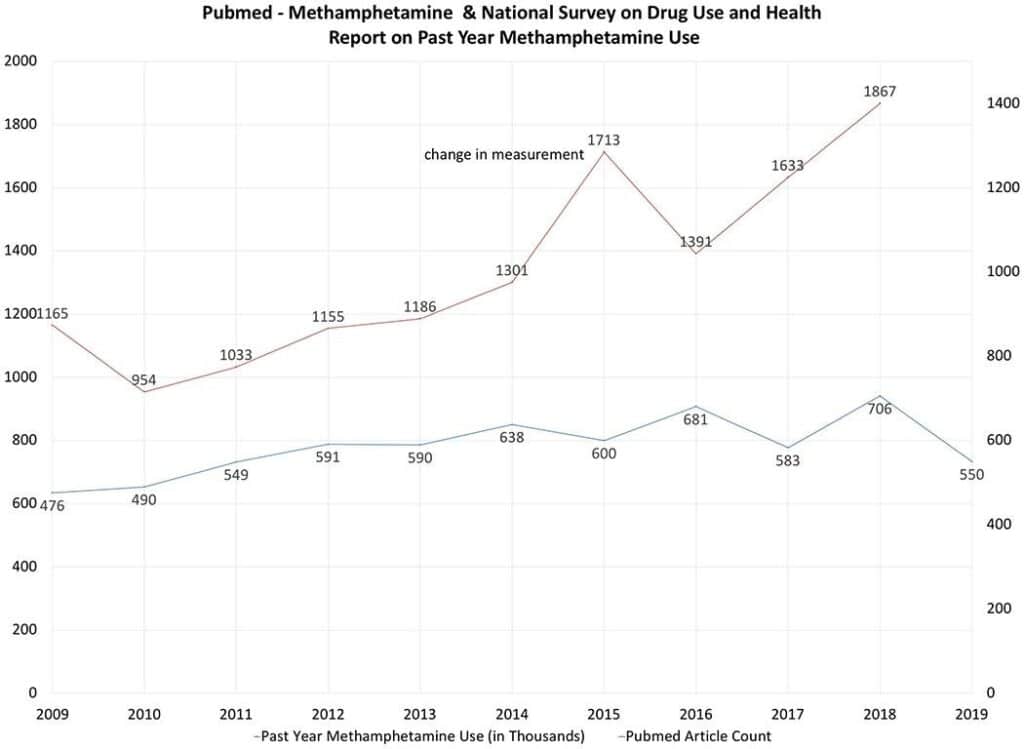Introduction
Medications that provide a rush of relief and healing can cause serious addiction. This addiction can be fatal to your health if not dealt with at the earliest. Early recognition and detoxification is the solution for such addiction that influences your health and well-being
The U.S. Drug Enforcement Administration recognizes Methamphetamine as a Schedule II stimulant, which makes it medically viable for use in the treatment of attention deficit hyperactivity disorder (ADHD). It is also used as a temporary supplement for weight-loss treatments. However, the medication earlier consumed for relief slowly becomes a source of pleasure.
In 2021, an estimated 2.5 million people reported using methamphetamine in the past 12 months and it remains one of the most commonly misused stimulant drugs in the world. This highlights the growing need to break free from its addiction clutches before it harms your health. This blog will provide you with information on how Methamphetamine impacts your health and how to detox from methamphetamines safely to improve your overall well-being.
Why detox from Methamphetamine?

This report from PubMed shows that there’s a rise in people using methamphetamines. When a person starts relying on Methamphetamine to live normally, it is a signal to undergo detoxification as early as possible. Methamphetamine is a highly addictive and potent stimulant drug that increases dopamine levels in the brain. This dopamine increase leads to a euphoric rush and provides a temporary escape from the harsh realities of life. The person soon becomes accustomed to that temporary pleasure and depends on it to lead the normal intercourse of life
This makes it harder for the person to quit using Methamphetamine after a certain amount of time. When they stop using it all of a sudden, they start to have withdrawal symptoms that make it harder to deal with. That’s why it’s essential to have a successful methamphetamine detox before the disease takes down your overall health.
Effects of Methamphetamine

Methamphetamines can have a profound impact on the brain by boosting the levels of certain neurotransmitters. These are the same chemicals that make us feel good, happy, motivated, and energized. When these chemicals are released, they can have a variety of effects on our health, both short-term and long-term.
Short term effects
- Frequent headaches and lack of energy
- Excessive sweating and fluctuation in body temperature
- Sleep disturbances and hallucinations
- decreased appetite
- faster breathing
- rapid and irregular heartbeat
- Increased irritability and mood swings
Long term effects
- Methamphetamine is a highly addictive substance, and individuals who consume it regularly can fall into the vicious cycle of addiction
- Recent research has indicated former users of methamphetamine may be at an increased risk of developing Parkinson’s disease, a neurodegenerative disease that impacts movement.
- It can develop certain mental health problems, such as anxiety and depression·
- Extreme weight loss and paranoia
- Confusion and memory loss
- It can also create certain heart diseases and problems
People who inject methamphetamine are also at increased risk of contracting infectious diseases such as HIV and hepatitis B and C. According to sources, the most serious health issues and the most common cause of death related to MUD are Cardiovascular disease and Cerebrovascular Disease. Methamphetamines-related strokes are on the rise and are more common in young men. Most of these strokes are hemorrhagic
Understanding Methamphetamine withdrawal
Methamphetamine detox is a challenging journey. It is a gradual process of cutting off your dependence on the drug. The person undergoing this phase of withdrawal needs to be mindful of the symptoms and unprecedented changes in their behavior and health In addition to dependence, the addict can also develop a tolerance to meth, which means they frequently feel the urge to use increasing amounts of meth to experience previously-achieved effects, such as euphoria.
Withdrawal occurs because of the sudden brain changes that occur when a person tries to eliminate methamphetamine from their system. When someone uses methamphetamine, their brain releases abnormal amounts of dopamine, which feeds the brain with pleasure and reward. The brain shows withdrawal symptoms when it doesn’t get fed by such pleasure
During detox, the withdrawal symptoms can be uncomfortable, and they’re usually the main reason why people can’t give up meth on their own.
Methamphetamine withdrawal symptoms
According to research, Methamphetamine withdrawal symptoms peak 24 hours after you stop using methamphetamines. Common signs of methamphetamine withdrawal include:
- Paranoia
- Agitation
- Anxiety
- Muscle aches
- Depression
- Fatigue
- Suicidal thoughts
- Itchy eyes
- Loss of appetite
These symptoms are categorized into Acute withdrawal symptoms and Protracted withdrawal Acute withdrawal symptoms commonly last 7-10 days, with cravings being the most reported symptom. Protracted withdrawal symptoms are like the symptoms of acute withdrawal, but they’re usually milder and stick around for a bit longer. They usually last for another couple of weeks after the initial withdrawal period is over.
Studies have indicated that the majority of methamphetamine-related psychoses are short-lived, ranging from a few hours to a few days; however, in some cases, the duration of the episode may be longer than six months and may recur during periods of drug abstinence.
However, the withdrawal timeline differs depending on the individual drug history, dose details, and medical condition. It’s necessary to manage the above symptoms to ensure a healthy detoxification.
How to detox from Methamphetamine
Detoxing from Methamphetamine is a gradual process. Here is a step-by-step way to tackle Methamphetamine addiction
- Condition assessment – Before engaging in any voluntary activity, it is essential to consult a medical professional to evaluate the current state of your health. If you have a history of methamphetamine use, a methamphetamine test may be recommended for detecting meth in your system. The process of detoxification depends on the extent of your dependency. A medical professional can make your experience easier and safer by creating a tailored plan based on your condition type.
- Gradual tapering– Sudden cessation of use can lead to a variety of withdrawal symptoms, some of which can be more difficult to manage than others. In this situation, tapering occurs when a user gradually releases themselves from the dependency on the drug, rather than simply ceasing to use it abruptly. This allows the body and mind to adjust to the reduced dosage without causing any adverse health effects.
- Supplements and Nutritional Support- Keeping the body nourished is important for a speedy recovery. Consuming a diet that is rich in essential vitamins, minerals, and antioxidants can assist in the healing process of the body. Additionally, maintaining adequate hydration levels will help to eliminate toxins and enhance overall health.
- Seeking support and relapse prevention– The safest and quickest route to methamphetamine rehab is undergoing relapse. There are lots of support groups, treatment centers, and communities out there for people who are going through their detoxification journey. Connecting with these people can help you learn from their experiences, gain valuable knowledge, and give you a better understanding of how to get back on track.
- Therapy and Counseling– Methamphetamine, due to its central nervous system involvement, has been observed to harm an individual’s mental health. Consequently, in this instance, therapy and counseling are beneficial in improving the mental health of the individual. This can be achieved through the resolution of the underlying issue, the promotion of a lasting recovery, and the prevention of relapse.
While there is no definitive pharmacological treatment for this substance disorder, a new study conducted by researchers at the National Centre for Clinical Research on Emerging Drugs (NCCRED) suggests that lisdexamfetamine has the potential to be the first pharmacotherapy for methamphetamine withdrawal.
Importance of self-care in methamphetamine detox

Self-care stands foremost when it comes to fighting against any addiction. By bringing these positive changes to your routine and lifestyle, you can quickly fix your health.
- Practice stress management- methamphetamine is believed to increase the stress level of a person. Some stress management techniques like yoga, meditation, or deep breathing can help in this case
- Stay hydrated- Drinking plenty of water is essential during detoxification to help flush out toxins and prevent dehydration.
- Exercise- Exercise is a great way to help reduce symptoms of methamphetamines. A study found that an aerobic exercise program could help reduce cravings for methamphetamines and help people with MUD control their urges. Plus, exercise by people with MUD was shown to reduce depression and anxiety over 8 weeks compared to a control group in health education.
FAQ (Frequently Asked Questions)
1. How do you get methamphetamines out of your system?
While the cure for methamphetamines is still in the early stages, certain medications help ease the symptoms. To eliminate the drug from your system, you can undergo a supervised methamphetamine detox. Consulting a medical professional can help you construct a process that is specially designed according to your medical history and condition.
2. What are the treatments for methamphetamine addiction?
The best treatment for methamphetamine addiction depends on the individual’s needs and circumstances. A thorough evaluation by a healthcare provider is necessary to create the most suitable treatment plan. Methamphetamine rehab usually includes medical detoxification, some behavioral therapy, and support services.
3. How long does methamphetamine detox typically take?
The length of time it takes to detox from methamphetamine depends on several factors, including your metabolism, how long and severe your drug use has been, and your health. Generally, the acute withdrawal symptoms tend to peak within the initial week of detox and diminish over a while, ranging from a few weeks to several months.
Conclusion
Getting out of methamphetamine addiction can be tough, but with the right help, education, and knowledge, it gets easier. During tough times, it’s important to talk about the problem and let your friends and family know. A lot of people don’t want to talk about their feelings of unease and end up dealing with it on their own. However, your journey need not be alone when there are people around you who provide you the courage and guidance to come out stronger and healthier. More than people’s love and support, it’s important to seek medical guidance and walk ahead with medical help.
Calusa Recovery has initiated a Crystal Methamphetamine Treatment Program where they offer general outpatient and intensive outpatient treatment plans, with sober living homes open to anyone who completes a program. In addition to the support provided in this program, each week, clients receive an individual counseling session, with family counseling added to the treatment plan as needed.










